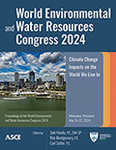Designing and Deploying Internet-of-Things-Enabled Water Diaries to Observe Personal End Uses
Publication: World Environmental and Water Resources Congress 2024
ABSTRACT
Urban water systems are facing supply shortages due to the combined effects of urbanization and the intensification of droughts caused by climate change. To address water shortages, water managers and utilities can employ demand management programs to focus on lowering water demands rather than increasing supply. Characterizing end uses, or the timing and volume of water use at fixtures, can help system managers facilitate water shortage intervention opportunities, design demand management programs, and assess program management effectiveness. While advances in smart meters, which collect data at sub-hourly intervals, have improved methods for characterizing end use, sophisticated disaggregation techniques are needed to classify end use events. Labeled datasets, which identify each trace or flow event, are needed to train end use disaggregation techniques but are not readily available. Labeled datasets are typically developed using high resolution flow meters at each fixture, which can be obtrusive and expensive. In addition, existing labeled datasets characterize end uses based on fixtures but not individuals, limiting knowledge that can be gained to characterize water use based on demographics such as age and gender. This research develops the Electronic Device for Residential Indoor Personal water Sensing (EDRIPS), which is a deployable button array that allows individual residents to quickly and conveniently log water use at fixtures. Individual water users record each use at a fixture by pressing an end-user identification button and a fixture-specific button, which are located on a device near the fixture. The end use event dataset is coupled with smart water monitor data that reports minutely flow data at the water meter to produce a personal labeled dataset. The EDRIPS system produces individualized end use disaggregation and provides labeled datasets that utilities can use to develop tailored demand management programs. EDRIPS is developed as a prototype of a semi-automated end use data collection system and creates a new dataset characterizing water end uses for individuals.
Get full access to this chapter
View all available purchase options and get full access to this chapter.
REFERENCES
N. Attallah, J. Horsburth, and C. Bastidas Pacheco. “An Open-Source, Semisupervised Water End-Use Disaggregation and Classification Tool,” Journal of Water Resources and Planning Management, vol. 149, no. 7, p. 04023024, 2023.
A. Cominola, M. Giuliani, D. Piga, A. Castelletti, and A. Rizzoli. “Benefits and challenges of using smart meters for advancing residential water demand modeling and management: A review,” Environmental Modelling & Software, vol. 72, pp. 198–214, 2015.
P. Gleick. “Global Freshwater Resources: Soft-path Solutions for the 21st Century,” Science, vol. 302, no. 5650, pp. 1524–1528, 2003.
Z. Heydari, A. Cominola, and A. Stillwell. “Is smart water meter temporal resolution a limiting factor to residential water end-use classification? A quantitative experimental analysis,” Environmental Research: Infrastructure and Sustainability, vol 4, no. 2, pp. 045004, 2022.
N. Gourmelon, S. Bayer, M. Mayle, G. Bach, C. Bebber, C. Munck, C. Sosna, and A. Maier. “Implications of Experiment Set-Ups for Residential Water End-Use Classification,” Water, vol. 13, no. 2, p. 236, 2021.
J. Ranjan, E. Griffiths, and K. Whitehouse. “Discerning Electrical and Water Usage by Individuals in Homes,” BuildSys ‘14, Memphis, TN, USA, 20–29, 2014.
V. Srinivasan, J. Stankovic, and K. Whitehouse. “WaterSense,” Proceedings of the Third ACM Workshop on Embedded Sensing Systems for Energy-Efficiency in Buildings, 2011.
M. Stavenhagen, J. Buurman, and C. Tortajada. “Saving water in cities: Assessing policies for residential water demand management in four cities in Europe,” Cities, vol. 79, pp. 187–195, 2018.
Information & Authors
Information
Published In
History
Published online: May 16, 2024
ASCE Technical Topics:
Authors
Metrics & Citations
Metrics
Citations
Download citation
If you have the appropriate software installed, you can download article citation data to the citation manager of your choice. Simply select your manager software from the list below and click Download.
